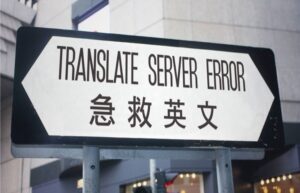Certified Translation vs. Certified Translator
What is a Certified Translation?
In the United States a certified translation consists of the following three parts:
- The source-language (original) text
- The target-language (translated) text
- A statement signed by the translator or translation company representative, with his or her signature notarized by a Notary Public, attesting that the translator or translation company representative believes the target-language text to be an accurate and complete translation of the source-language text.
Sometimes this statement bears the title “Certificate of Accuracy” or “Statement that Two Documents Have the Same Meaning.” ATA-certified translators can attach their certification stamp to the notarized statement. Please note that any translator and any translation company representatives, regardless of credentials, may “certify” a translation in this way. A translator does not need to be “certified” in order to provide a “certified translation.” It is also important to realize that the Notary Public seal assures only that the signature is that of the person who presented him or herself to the notary; The Notary Public is not attesting to the accuracy of the translation.
What is a certified translator?
In contrast to many other countries, in the United States there is no federal or state licensing or certification for translators. There are some credentials available to translators working in some language pairs in this country, but they do not carry the same weight—in the marketplace or in the translation community—as federal licensing or certification in other countries. The American Translators Association offers translator certification in various language pairs. ATA-certified translators are required to specify the language pairs and directions in which they are certified. For example, a translator certified in German to English is not necessarily certified in English to German. Please note that there are many languages for which there is no type of certification or screening available in this country. There are many excellent, experienced translators and interpreters who are not certified. In the United States it is not necessary to be certified or licensed in order to provide a certified translation for official use, unless the entity receiving the translation specifies that the translation must be done by an ATA-certified translator.
Written by Caitilin Walsh, CT; French/German to English translator and ATA President-Elect
12 Comments
Leave a Comment Cancel Reply
Language Services Directory
Subscribe to The ATA Compass
Connect with The ATA Compass
Recent Posts
Translator vs. Interpreter
Watch a Day in the Life of Translators and Interpreters See how translators and interpreters work in this short animated video. Translators do the writing Translators work with the written…
Read MoreWhy Should I Hire a Professional?
It takes more than just the ability to understand two languages. Professional translators and interpreters have the education, experience, and expertise to understand the nuances in one language and transfer…
Read MoreClient Assistance
Can I afford to hire a professional? You can’t afford NOT to. Poor translation and interpreting services can be disastrous for your business. See what’s at stake. Learn More What’s…
Read MoreKnow Your Rights to Language Access
Is English Not Your Primary Language? If you have a limited ability to read, write, speak, or understand English, you are considered to be Limited English Proficient (LEP). As an…
Read MoreLanguage Services Directory
Start Your Search ATA’s Language Services Directory includes a list of all ATA members of individuals, as well as companies. Need help finding the right professional? Professional translators and interpreters…
Read MoreFind a Translator or Interpreter Near You
Searching for a Nearby Translator or Interpreter? Whether you require accurate document translations, real-time interpreting for an event, or specialized industry expertise, finding the right professional near you has never…
Read More







This is seriously a great post as there is no “official” governmental information on this in the US. When I first moved to the US I was not sure if I was allowed to certify translations or not. Thank you, Caitlin.
Actually in the United States a “certified translation” does not necessarily need to be sworn to before a notary. Notarization is needed only when required by the agency requesting the certified document. At our agency, we refer to the different documents a “Certificates of Accuracy” and “Affidavits of Accuracy” for purposes of clarity.
How does an ATA- accredited translator become a certified translator?
Claudette Roland
So if I have a document in Spanish and needs a certified English translation for USCIS purposes, what do I need to do or where do I go? If it doesn’t say it needs to be notarized just certified, then what?
Thank you for your comment! On our website: https://www.atanet.org/, you can search for a Spanish to English translator to help you with this!
[…] Caitilin Walsh Reblogged from The ATA Compass blog with permission from the […]
[…] For more in-depth understanding, information is available from the ATA Compass. […]
I’ve always wondered how federal documents get translated into different languages. I recently filed my taxes, and there were many different language options. I didn’t know that a translator could be certified from English to a different language, but not necessarily from a different language to English. That’s a cool fact I’ll remember.
Reblogged this on Riverside Notary Services and commented:
So helpful on translation and notary services.
The way you wrote about certified translation, I loved. Thanks for sharing.
Good information. Certified translation services become even more important when dealing with Apostille translations. For details please see:
“How to Get a Document Apostille to Obtain Certified Translation of Public Documents for Use Abroad”
https://www.languagealliance.com/blog/apostille-document-translation-services/
and
“Apostille Translation Services,in the Practice of Law”
https://www.translationforlawyers.com/2017/04/apostille-translation-services-practice-law.html
Very useful information. Thanks.